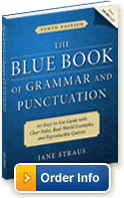|
Hi, Friend.
Welcome to your GrammarBook.com E-Newsletter.

|
“I look forward to your newsletter every time. I make sure that my coffee and biscuit are present, then I settle down to be enthralled by the English language.”
—Sheena B.
“Thank you for the who/whom advice. It is something which I, like I'm sure many others, have always had trouble with.”
—Oliver M.
“Your E-Newsletter grammar tips are a great help.”
—Desiree G. |
|
|
To Split or Not to Split
Not everyone knows what an infinitive is, but everyone uses them.
Infinitives are formed when a verb is preceded by the word to, as in to run or to ask. Hamlet’s “To be or not to be” speech might be the most celebrated use of infinitives in English literature.
One of the great misconceptions about English is that it is wrong to “split” an infinitive—that is, to put a word or words between to and the verb. According to this superstition, to quickly respond or to outright refuse is incorrect; we should say instead, to respond quickly or to refuse outright. This supposedly preserves the “integrity” of the infinitive.
The myth sprang up in the 18th century, when grammarians decreed that English should be modeled on Latin. In Latin, infinitives are one word, so they can’t be split. The trouble is that English is a Germanic, not a Romantic, language. Imposing Latin rules on English is like demanding that cats act like dogs.
There is no point in splitting an infinitive just for the fun of it. Experienced writers do not split capriciously. But sometimes they prefer to—and sometimes they have to. A classic example of the latter case: I expect my salary to more than double. There’s no other place for more than except right between to and double.
Would Hamlet’s speech be so admired if it opened with “To be or to not be”? Splitting infinitives with not is usually a terrible idea. I decided not to go is smooth and graceful; I decided to not go is clunky.
But now consider this caption for a cartoon in The New Yorker magazine: “I’m moving to France to not get fat.” In such a case, it’s hard to steer clear of to not. You could avoid splitting the infinitive with something stodgy like, “I’m moving to France so as not to get fat,” but that takes all the punch out of the punchline.
Finally, notice how often infinitives are split by dispensable adverbs, as in this sentence: I intend to vigorously protest. The verbs intend and protest are dynamic enough to make vigorously extraneous—I intend to protest would be an improvement. Any time an adverb can be removed, it should be.
Due to the E-Newsletter's large readership, please submit your English usage questions through GrammarBook.com's “Grammar Blog.”
|
|
Pop Quiz
Which sentences would be improved by “unsplitting” the infinitive? Which ones are fine the way they are? See our views in the answers section.
1. I was hoping she’d choose to not attend.
2. He wanted to strongly advise against it.
3. Alice needed to quickly leave.
4. She’s not expected to immediately fix the problem.
5. We decided to gradually get rid of the clutter.
Free BONUS Quiz For You!
Friend, because you are a subscriber to the newsletter, you get access to one of the Subscription Members-Only Quizzes. Click here to take a Subject and Verb Agreement Quiz and get your scores and explanations instantly!

“So convenient...hundreds of quizzes in one click.”
Friend, Subscribe to receive hundreds of English usage quizzes not found anywhere else!
- Take the quizzes online or download and copy them.
- Get scored instantly.
- Find explanations for every quiz answer.
- Reproduce the quizzes to your heart's content.
- EASY to use.
- No software to download.
- No setup time.
- A real person to help you if you have any questions!
“Fun to test my skills!” “The explanations really help...thanks!”
Your choice: Subscribe at the $29.95 or $99.95 level ($30 off - regularly $129.95).
“I download the quizzes for my students who don't have computer access.”
Subscribe today to receive hundreds of English usage quizzes not found anywhere else!
“Makes learning English FUN!”
 |
Don't need all the quizzes at once?
You can now purchase the same quizzes individually for ONLY 99¢ each. Purchase yours here.
|
|

Get Yours Today!
Get Amazon’s #1 Bestseller in Four Categories!
#1 in Grammar
#1 in Reading
#1 in Lesson Planning
#1 in Vocabulary
|
The Blue Book of Grammar
and Punctuation by Jane Straus
An indispensable tool for busy professionals, teachers, students, homeschool families, editors, writers, and proofreaders.
Now available in print AND as an e-Book! Over 2000 copies are purchased every month!
Order Your Copy Today!
- Hundreds of Grammar, Punctuation, Capitalization, and Usage Rules
- Real-World Examples
- Spelling / Vocabulary / Confusing Words
- Quizzes with Answers
|
View the entire contents online
Discounts available for schools, bookstores, and multiple copies. Order Today!
 Wordplay Wordplay
The following are purportedly real newspaper headlines. Further evidence that proofreading is a dying art?
Something Went Wrong in Jet Crash, Expert Says
Police Begin Campaign to Run Down Jaywalkers
Panda Mating Fails; Veterinarian Takes Over
Pop Quiz Answers
There are no right answers; these are our suggestions.
1. I was hoping she’d choose not to attend.
2. He wanted to strongly advise against it. (to strongly advise sounds more forceful to us than to advise strongly.)
3. Alice needed to leave. (The urgency of “needed” makes “quickly” unnecessary.)
4. She’s not expected to fix the problem immediately.
5. We decided to gradually get rid of the clutter. (Best option, although some would argue for get rid of the clutter gradually. Decided gradually to get rid of is ambiguous. Get gradually rid of and get rid gradually of strike us as ghastly alternatives.)
Learn all about who and whom, affect and effect, subjects and verbs, adjectives and adverbs, commas, semicolons, quotation marks, and much more by just sitting back and enjoying these easy-to-follow lessons. Tell your colleagues (and boss), children, teachers, and friends. Click here to watch.
|